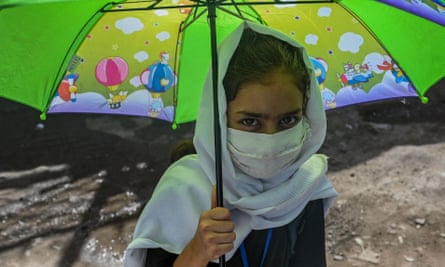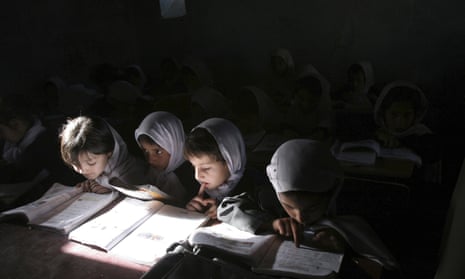Afghanistan’s only boarding school for girls has temporarily relocated to Rwanda, its co-founder has said, just days after a video of her burning class records to avoid Taliban recriminations was widely shared on social media.
Shabana Basij-Rasikh, who escaped Kabul with 250 students and staff, urged the world to “not avert your eyes” from the millions of girls left behind.
“See those girls, and in doing so you will hold those holding power over them to account,” said Basij-Rasikh in a tweet, as she vowed to return to Afghanistan.
Another teacher, Pashtana Durrani, executive director of Learn Afghanistan, who is now in hiding, vowed she would “raise an army, just like the Taliban did – only mine will be of educated determined Afghan women”.
The Taliban leadership has sought to portray itself as more moderate than 20 years ago, when it imposed a brutal rule, stopping women from studying and working. The have insisted women will have the right to both. But reports of women being sent home from their jobs and from universities are exacerbating fears the reality will be very different.
Aid leaders urged the international community to use their leverage of foreign aid to stop a reversal of two decades of hard-won advances in girls education.
“The challenge now is to defend the gains made,” said Kevin Watkins, visiting professor at the Firoz Lalji Institute for Africa and former head of Save the Children. “Pragmatists in the Taliban leadership will be aware they desperately need international support to respond to a potential famine, deliver basic services, and create jobs. Aid donors must now walk the fine line between demanding the Taliban protect girls’ education and delivering finance to communities.”
When Taliban last held power in 2001, only about 12% of primary-aged girls attended some sort of school, rising to about 50% in 2015, according to an analysis of survey data by the Washington-based thinktank Center for Global Development. In 2020, 39% (3.7 million) of the 9.5 million children attending schools were girls.
Watkins said he had visited villages where the Taliban had forbidden the creation of a girls’ school, but “turned a blind eye” to classes held in the homes of female teachers.
The extraordinary gains in education were “not driven by administrative decrees from an enlightened government in Kabul,” said Watkins, but instead “won and defended through the quiet heroism of local communities, teachers, and NGO workers who have negotiated – and challenged – Taliban commanders.”
Unicef struck a deal with the Taliban in December to establish primary classes for 140,000 children, including girls, in areas controlled by the group.
Sarah Brown, chair of children’s charity Theirworld, said girls’ education had improved exponentially in Afghanistan.
“Other governments cannot stand back and watch if this is to be stripped away and can use their leverage for donor commitments for girls’ education,” said Brown. “The G7’s emergency summit on Afghanistan next week should also step up.”
“The playbook exists to roll out safe schools in Afghanistan with all the guidance needed,” Brown said.

Last week, Unicef’s chief of field operations, Mustapha Ben Messaoud, told a UN briefing he was optimistic about working with Taliban officials, citing their early expressions of support for girls’ education. Other international groups have told the Guardian they have had similar exchanges with the group.
But Ashley Jackson, coordinator at the Overseas Development Institute, said: “We don’t know what the Taliban rules are yet because they haven’t announced any rules. But the only way to keep the gains made in education is to talk to the Taliban. Unicef has said it is optimistic. They are optimistic because they have to be. Unless we engage with them there is literally no hope.”
Heather Barr, associate director of women’s rights at Human Rights Watch, said: “The Afghans I talk to are saying again and again, they [the Taliban] are trying to look legitimate now, but as soon as people stop paying attention they will be themselves again. We know what that meant in the 1990s.”
Any influence the outside world could bring to bear through aid and the Taliban’s need for legitimacy could be a useful lever, said Barr. “If organisations can make deals with the Taliban to get girls into primary schools, that’s positive and life changing,” she said. But she also said that could be wishful thinking.
Laurie Lee, chief executive of Care International, which educates boys and girls in Afghanistan, said the UK and other governments must “trust the NGOs”.
“We’ve managed to run schools over several years in all parts of Afghanistan including in places where previously schools didn’t exist,” Lee said. “We’ve been able to negotiate that with local leaders and we hope that will carry on.”
Susannah Hares, a director of the Center for Global Development, predicts a huge drop in school attendance, despite Taliban assurances, in mixed sex schools. Only 16% of schools in Afghanistan are girls-only.
